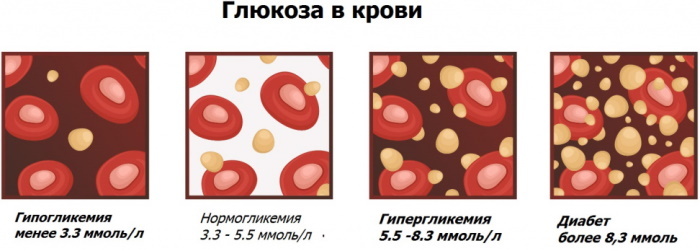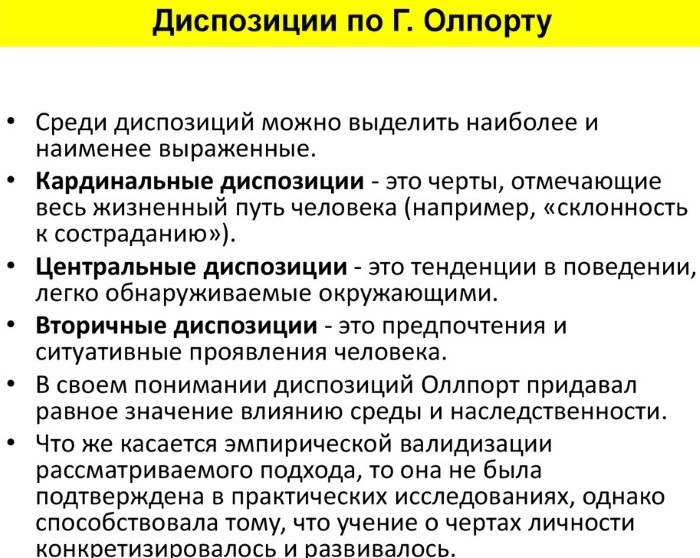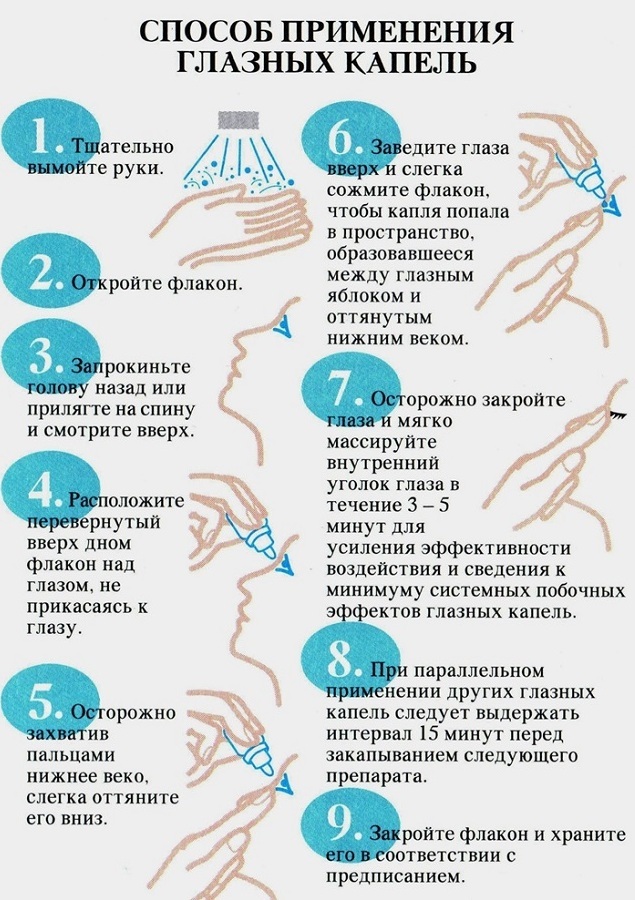Content
- What is a diuretic, why is it used
- Who should not drink diuretics
- Diuretic classification, mechanism of action, examples of names
- Renal diuretics
- Extrarenal diuretics
- Potent, or potent ("overhead") diuretics
- Medium-acting diuretics
- Potassium-sparing diuretics
- Aldosterone antagonists
- Na channel blockers
- Carbonic anhydrase inhibitors
- Osmotic diuretics
- Herbal diuretics
- How synthetic diuretics differ from herbal remedies, which are more effective
- What does the use of diuretics entail?
- Herbal Diuretic Recipes
- Birch leaves
- Birch buds and lingonberry leaves
- Rosehip and hawthorn fruit
- Field horsetail
- Knotweed and bearberry leaves
- Diuretic Videos
The diuretic medicine is from a large group medication, which helps to stimulate the urinary system when certain symptoms occur. A remedy from this group may have different properties and have a different composition, therefore it is selected individually, taking into account the symptoms and the presence of complications in the patient.
What is a diuretic, why is it used
Preparations with diuretic properties prevent the absorption of certain components in the kidneys, increase the production of urine and stimulate its excretion. With their use, there is an increase in daily urine output, increased kidney function and elimination of tissue edema. Medicines of this group are used for various diseases, accompanied not only by a decrease in the amount of daily urine, but also by some complications against the background of such a condition.
Today, drugs can have different compositions, have different properties. Experts identify several types of such medicines.
The main indications for prescribing drugs:
- Severe arterial hypertension. Drugs in this group are usually used for hypertensive crisis, when the indicators reach critical levels.
- Glaucoma.
- Increased intracranial pressure.
- Heart failure, accompanied by tissue edema as a result of weakening of the myocardium and disruption of its work.
- Kidney pathologies in a chronic form, when there are no acute symptoms, but it is necessary to stimulate the work of the paired organ.
- Liver pathology, cirrhosis.
- Ascites. The accumulation of fluid in the abdominal cavity often occurs against the background of cardiac pathologies.

The drugs can be used as part of the complex treatment of poisoning with toxins, food or medicines.
Who should not drink diuretics
A diuretic is a medication that not all patients are allowed to use.
Drugs from different groups can provoke complications, so doctors identify some general contraindications for all types of drugs:
- Intolerance to the ingredients of the composition.
- Pregnancy and lactation period. Some relatively safe drugs can be used in an acute need once.
- Severe respiratory distress.
- Acute kidney disease and severe renal failure.
- Deficiency of potassium and calcium in the body.
- Persistent hypotension.
- Severe diabetes mellitus.
For a particular patient, individual contraindications can be determined that are absent in the official recommendations. This is due to the peculiarities of the course of the disease and the frequent presence of additional complications.
Diuretic classification, mechanism of action, examples of names
Today, experts identify several groups of diuretic medicines with different properties and composition. Some of them act for a long time, others affect the urinary system only for a few hours.
Renal diuretics
Drugs in this group affect the enzymes of the kidneys, which provide the transport of electrolytes. The components of the composition block these enzymes, and also inhibit reabsorption in the final tubules. This leads to increased excretion of sodium, potassium and chlorine ions, an increase in daily urine output.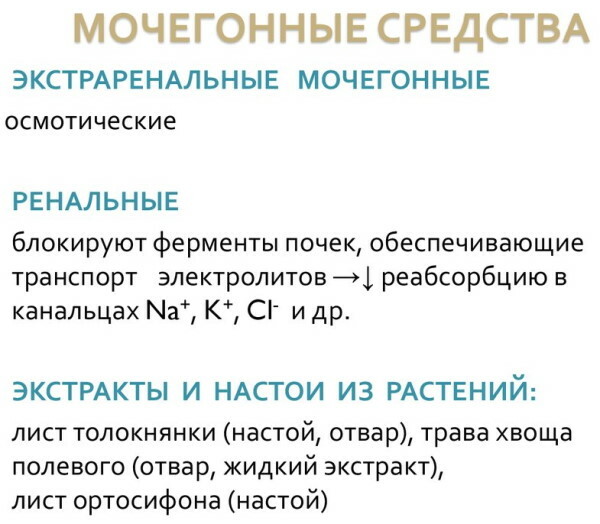
This group of drugs differs from other drugs in strong action, high efficiency and long-term preservation of the therapeutic effect. The effect lasts for 1-2 days, which is considered one of the best indicators. Despite the effectiveness of medicines, many drugs in this group are highly toxic, therefore they are not used so often, only in case of acute indications.
The daily dose of such funds is determined depending on the condition. The drugs are available in the form of a solution for parenteral administration. The average rate is approximately 0.5-1 ml per day. Repeat the introduction of solutions no more than 1 time in 4-5 days. The use is usually carried out in short courses, since the toxicity of the funds can lead to complications.
The most popular representative of the group is the drug Merkuzal, which can be purchased for 160-230 rubles. The tool Promeran can also be used and costs about 200-280 rubles. Such funds are rarely used today due to toxicity.
Extrarenal diuretics
A diuretic is a medication that can be used for edema and certain diseases of the internal organs. For example, extrarenal diuretic drugs are considered relatively safe for patients and have a rapid therapeutic effect rather quickly.
The mechanism of action of the drugs is somewhat different. It is based on the ability of drugs to increase the osmotic pressure of plasma and increase filtration without tubular absorption. As a result, there is an increase in the volume of daily urine. The action of the drug occurs approximately 1-2 hours after parenteral administration and lasts for 4-6 hours.
The drugs are considered effective and can be used in courses of 5-10 days, depending on the patient's condition. The daily dosage depends on what kind of medication is used.

| Name | Dosage and price |
| Mannitol | The drug is administered intravenously using a dropper, 100-200 ml per day. Sometimes the dose is increased to 300-400 ml per day. You can buy a bottle for 90-150 rubles. |
| Mannit | This medication can be administered in an amount of 200 ml per day using a dropper. The cost of a bottle of the product ranges from 120-140 rubles. |
The dosage and duration of medication treatment may vary depending on the symptoms and the body's response to the components of the composition.
Potent, or potent ("overhead") diuretics
The most effective group of medicines, representatives of which can be dangerous to patients if used incorrectly. Medicines are also called loop diuretics. Their mechanism of action is based on the ability of active ingredients to act in the area of the Henle loop, disrupting reabsorption and some other processes.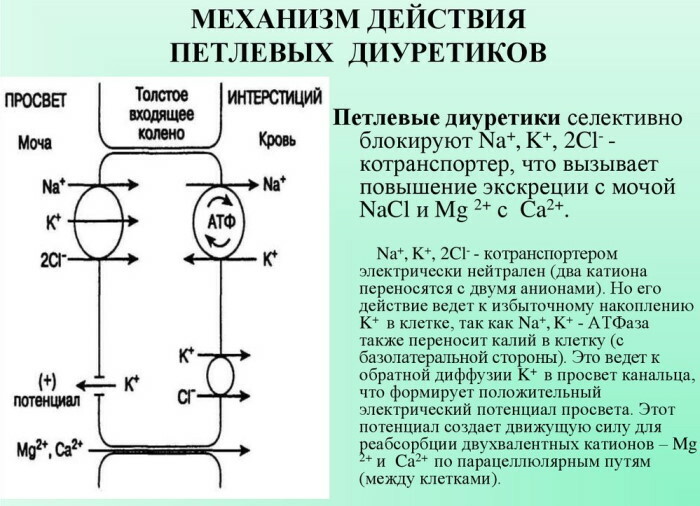
This action leads to a rapid increase in the volume of urine, as well as the speedy excretion of potassium, magnesium and other substances. The action of the drugs is noted quite quickly, that is, after 15-30 minutes, a diuretic effect is observed. This period depends on the chosen dosage form.
The main difference between drugs and other drugs is considered to be a short-term effect, which lasts no more than 8 hours. The drugs are available as solutions and tablets. With parenteral administration of the solution, the effect is achieved faster than when taking tablets.
The most popular means of the group:
- Torasemide. The cost of the medication ranges from 290-350 rubles.
- Furosemide can be purchased for about 50-120 rubles.
- Lasix costs about 180-220 rubles.
The dosage of drugs depends on the severity of the symptoms and the specific medication. Usually prescribed from 20 to 60 mg per day. The duration of use rarely exceeds 5 days, but longer courses are possible, if necessary.
Medium-acting diuretics
A diuretic medicine is a medicine that can have a pronounced or moderate effect. An agent with an average strength of action is prescribed in the case when the patient has symptoms of any disease, but there are no complications.
Medicines in this group are also called thiazide diuretics. They affect the reabsorption of chlorine, reduce it, which leads to an increase in the daily volume of urine. The action of medications begins approximately 40-60 minutes after administration, which distinguishes them from other drugs that act faster. The effect lasts for 10 hours. The indicator is considered average.
The drugs are effective and well tolerated by patients; they are often used in courses of 10 days. The dosage depends on the severity of the manifestations and the specific agent prescribed by the doctor. On average, patients consume 1-2 tablets per day.
The most popular drug in the group is Dichlorothiazide. You can buy it for 120-190 rubles. Patients can also use Polythiazide, which costs 200-230 rubles.
Potassium-sparing diuretics
A popular group of medicines, the use of which allows you to achieve a diuretic effect, but not to provoke an intensive excretion of potassium from the body. This effect is especially important for patients with heart disease.
Aldosterone antagonists
The mechanism of action of funds from this group is based on the ability of active ingredients to increase the daily volume of urine, but not to provoke the development of potassium deficiency. The action of the main components is similar to the effect in the body of aldosterone. One of the important differences between these drugs and other diuretics is the slow development of a diuretic effect.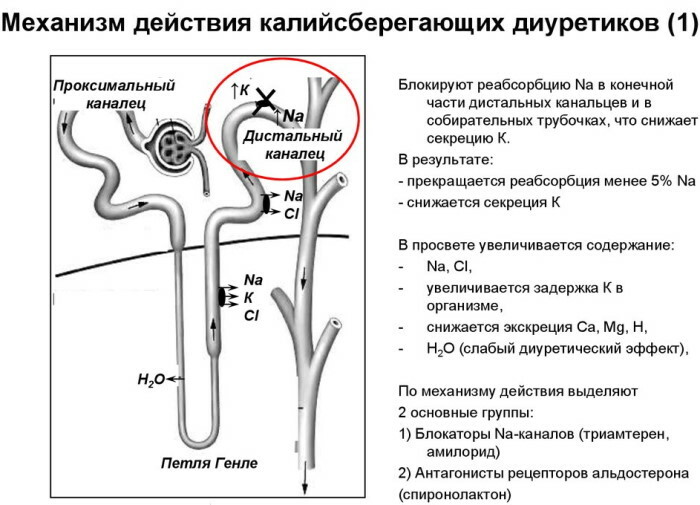
That is, the first result appears 2-5 days after the start of admission and lasts for several days after the end of the course. Drugs in this group are considered effective and relatively safe, in contrast to potent diuretics. They can be used even if there are any kidney abnormalities.
The most effective means of the group:
- Veroshpiron it is prescribed as an independent method of therapy or in combination with antihypertensive medications. Its cost is approximately 90-150 rubles.
- Inspra - an effective medication from the group of aldosterone antagonists, which can be purchased for 1300-2800 rubles. depending on the number of tablets in the package.
The dosage of the medication depends on the drug. For example, Veroshpiron is taken at 100-200 mg per day. Inspra is used at 25-50 mg. The duration of treatment with drugs of the group can last up to 3 weeks, if necessary.
Na channel blockers
Drugs in this group also help prevent the development of hypokalemia, as well as block sodium channels, while increasing the daily volume of urine. As a result, there is an intensive work of the kidneys, rapid filtration of blood and a decrease in the absorption of some components during primary filtration.
The effect of the drugs develops within 2-4 hours after oral administration and lasts for 8-14 hours. This is considered one of the most important differences from the representatives of the aldosterone antagonist group. Medications are relatively safe and effective for patients, and are available mainly in the form of capsules and tablets for oral administration.
The most popular means of the group is Amiloride, the cost of which is 360-450 rubles. Patients can be prescribed Triamteren, which can be purchased for 220-340 rubles.
The dosage of the drug per day is usually 50 mg, but it can increase by 2-3 times, depending on the initial condition of the patient, whether he has other symptoms. Take the remedy in courses of 5-10 days. The absence of a long-term effect is an advantage of medications, since the likelihood of an overdose is reduced against the background of the accumulation of components.
Carbonic anhydrase inhibitors
A diuretic is a medication whose mechanism of action may be based on inhibition of carbonic anhydrase. This group of drugs also has diuretic and decongestant properties by increasing the daily volume of urine. The effect of the drugs develops in about 30 minutes, but lasts for 4 hours. This group of medicines is considered one of the safest due to its short period of action and lack of cumulative effect.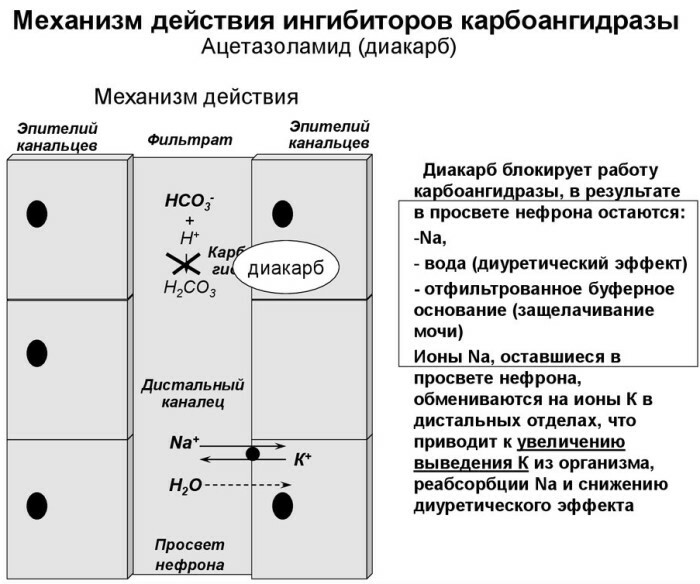
The drugs are used in courses of 3-5 days. Depending on the specific drug, the dose per day is different. For example, the Diakarb remedy costs about 270 rubles. Take it at 250 mg per day. The medication is today considered one of the few representatives of the group actively used in the treatment of children and adults.
Osmotic diuretics
Osmotic agents act for a short period of time, increases osmotic pressure, increases daily urine output, enhances the excretion of potassium from the body. The action of the drug begins 1-2 hours after the start of administration, and lasts for 10 hours.
The main difference from other medicines is that medicines are administered mainly intravenously using a dropper. The main representative of the group is Mannitol, which costs about 150 rubles.
The daily dosage of such a drug is usually 100-400 ml. The duration of treatment rarely exceeds 5 days, but is adjusted individually for each patient.
Herbal diuretics
On pharmacy shelves you can find herbal products. They are rarely available in tablet form, solutions, or capsules, and you can usually find dried herbs packaged in plastic or paper bags.
The mechanism of action of such agents is based on the ability of plants to stimulate the kidneys and increase daily urine output. Such funds act quickly, the effect can be noted after 30-40 minutes, but it usually lasts no longer than 4 hours.
The cost of such funds is low, ranging from 50-120 rubles. per packing. The dosage and duration of application depends on the particular plant used by the patients. Diuretic plants are usually used for at least 2 weeks. The most effective plants with a diuretic effect are bearberry, horsetail, birch leaves.
How synthetic diuretics differ from herbal remedies, which are more effective
A diuretic is a medication that is not always synthetic. The main difference between herbal remedies and medicines based on herbal ingredients is considered to have no effect on sodium absorption, potassium excretion from the body. That is, herbal preparations only speed up kidney function and blood filtration, which leads to increased urination.
Natural medicines are considered safer, but the effectiveness is much higher for drugs of synthetic origin, especially in the presence of severe diseases of the heart, blood vessels, and other organs.
What does the use of diuretics entail?
Diuretics should be used only when indicated, since uncontrolled intake can provoke various complications.
Most common reactions:
- Decrease in blood pressure.
- Nausea and bouts of vomiting.
- Headaches and dizziness.
- Convulsions.
- Critical decrease in the level of potassium in the blood.
- Worsening of the symptoms of heart disease.
- Dehydration.
Such complications can be avoided only with the correct use of drugs, adherence to all the doctor's recommendations.
Herbal Diuretic Recipes
The use of diuretics of natural origin can be carried out at home. For this, patients can use one of many recipes.
Birch leaves
The plant has diuretic properties and helps to eliminate edema, slightly reduces blood pressure, prevents the development of complications in diseases of the heart and blood vessels.
The tool can be found in drugstores in the form of filter bags. To prepare 1 portion of the product, you will need 1 bag and 150 ml of boiling water. Tea is infused for 20 minutes, then taken orally. You can repeat the reception no more than 2 times a day, but no later than 4 hours before bedtime. The duration of use is 10-14 days.
Birch buds and lingonberry leaves
Effective herbal remedies for achieving a diuretic effect at home. To obtain the infusion, it is necessary to separate 20 g of dry birch buds and lingonberry leaves, pour 300 ml of boiling water.
It is necessary to infuse the product for at least 3 hours, and then filter. Take the resulting infusion 50 ml 2 times a day, preferably in the morning and lunchtime. The duration of use does not exceed 10 days.
Rosehip and hawthorn fruit
On the basis of the fruits of wild rose and hawthorn, a decoction with diuretic properties is prepared, which is taken in courses of 2 weeks.
To obtain a decoction, you need to follow the steps step by step:
- Separate 50 g each of the rosehips and hawthorns.
- Boil in 1 liter of water for 10 minutes after boiling.
- Leave on for 2 hours.
- Filter.
It is necessary to take the resulting broth at 200 ml per day, dividing the rate several times. Do not use the product before bedtime.
Field horsetail
The plant can be used as the sole ingredient for making diuretic tea. For 200 ml of boiling water, you need 3 g of a dry plant, the infusion time is 30 minutes.
It is necessary to take such tea in the morning after a meal, repeat no longer than 2 weeks in a row. The tool not only stimulates the kidneys, but also eliminates some of the symptoms of cardiovascular pathologies.
Knotweed and bearberry leaves
A decoction based on bearberry and knotweed leaves helps to strengthen kidney function, increases daily urine output, eliminates edema, and slightly reduces blood pressure.
To prepare the product, you need to take 10 g of each ingredient in dry chopped form, place in a saucepan, add 500 ml of water. After boiling the mixture, you must cook it over low heat for 3-4 minutes.
The cooled broth should be filtered and taken in the morning in an amount of 150 ml. The minimum course duration is 7 days.
A diuretic medicine is an effective medicine with pronounced properties that acts on the kidneys and stimulates their work. The tool is used only according to indications and after examination. Herbal medicines can be used at home, but prior consultation with a doctor is required.
Diuretic Videos
We disassemble diuretics. How do they work:

